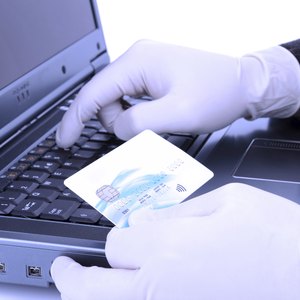
Identity theft can be a nightmare for a consumer to deal with. You’ll have to call the Federal Deposit Insurance Corporation at 877-IDTHEFT to report the incident, contact the credit bureaus and make sure nobody has used your accounts without your permission or opened up new ones in your name. As long as you catch the theft promptly, however, the bank will wind up paying most or all of the unauthorized charges.
How Thefts Happen
Bank information is vulnerable to identity theft in several ways. A thief can purloin checks from your mailbox when you get a new delivery or slip your checkbook out of your wallet. Sophisticated thieves may take only a blank check or two, hoping you won’t notice the missing items until it’s too late. If a thief steals or copies your driver’s license or Social Security card and number, it's even easier for that thief to open false accounts in your name. Thefts of credit and debit card information can occur via online hackers, credit card skimmers that intercept them from careless merchants and paper receipts that are pocketed or copied.
Credit Card Charges
The Fair Credit Billing Act limits individual liability for unauthorized credit card charges to $50, so the issuing bank is responsible for any further unauthorized access to the account. Many credit card companies waive even that $50 amount, particularly if the fraud is caught quickly. Should the theft be reported before the credit card is used -- like if a new card is stolen from your mailbox, then activated and used by an identity thief after you report it missing -- the bank is responsible for all charges.
ATM and Debit Cards
If your automated teller machine, or ATM, card or debit card is stolen or compromised, the bank’s liability depends upon how quickly you catch and report the incident. If you report the loss within two business days after you realize it’s missing, you may be responsible for losses up to $50, depending on your bank’s policy. Anything above that is the bank’s liability. If you report the loss after two business days, your individual liability increases to $500. If you wait more than 60 days after the bank sends you a statement with the unauthorized transactions on it, the bank isn’t liable for unauthorized charges.
Card Number Theft
Should identity theft result in someone using your debit card number rather than the physical card, your have more of a chance to limit your liability and increase the bank’s. As long as you report the unauthorized transactions within 60 days after you receive a statement from the bank that includes them, you won’t be liable for the charges.
Physical Checks
When identity thieves steal your checkbook, the liability limits for any bad checks are determined by state law. Authorizing checks from your account is ultimately the bank’s responsibility, as it must match the signature on each check with the one it has on file for you. Banks also must verify a change in physical address, email address and phone number before changing anything on your account; this limits the ability of identity thieves to get a new line of checks send to their location. Your state’s consumer protection website can let you know the specific liability limits where you live.
References
- Bankrate: 12 Steps for Victims of Identity Fraud
- Las Vegas Review-Journal: 8 Identity Theft Myths You Should Ignore
- Federal Trade Commission. "Disputing Credit Card Charges." Accessed April 21, 2020.
- Federal Deposit Insurance Corporation. "Consumer Protection Topics - Billing Errors and Resolution." Accessed April 21, 2020.
- Federal Trade Commission. "How to Recognize and Avoid Phishing Scams." Accessed April 21, 2020.
- Discover. "How Does Discover Handle Fraud?" Accessed April 21, 2020.
- Capital One. "I Have a Problem With a Charge on My Credit Card." Accessed April 21, 2020.
- Apple Inc. "Identify Legitimate Emails From the App Store or iTunes Store." Accessed April 21, 2020.
- Wells Fargo. "Zero Liability Protection." Accessed April 21, 2020.
- Federal Trade Commission. "Lost or Stolen Credit, ATM, and Debit Cards." Accessed April 21, 2020.

